Evolution of Management Theory & Practice
VerifiedAdded on 2023/01/13
|10
|2611
|42
AI Summary
This report discusses the evolution of management theory and practice before, during, and after the industrial revolution. It explores the different theories and practices that have shaped the field of management and their impact on businesses and organizations. The report highlights the importance of understanding and applying management concepts in order to achieve organizational goals and objectives.
Contribute Materials
Your contribution can guide someone’s learning journey. Share your
documents today.
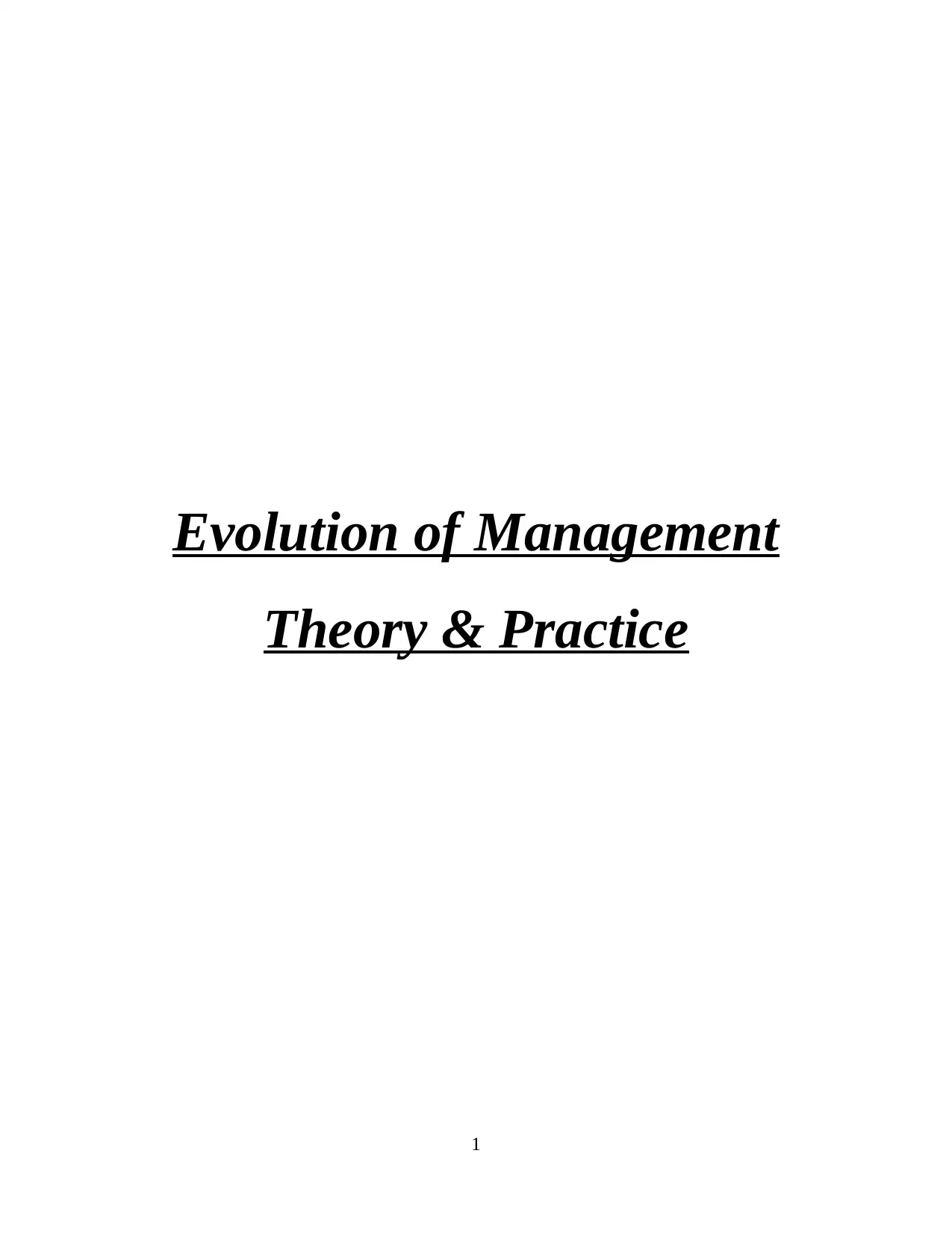
Evolution of Management
Theory & Practice
1
Theory & Practice
1
Secure Best Marks with AI Grader
Need help grading? Try our AI Grader for instant feedback on your assignments.
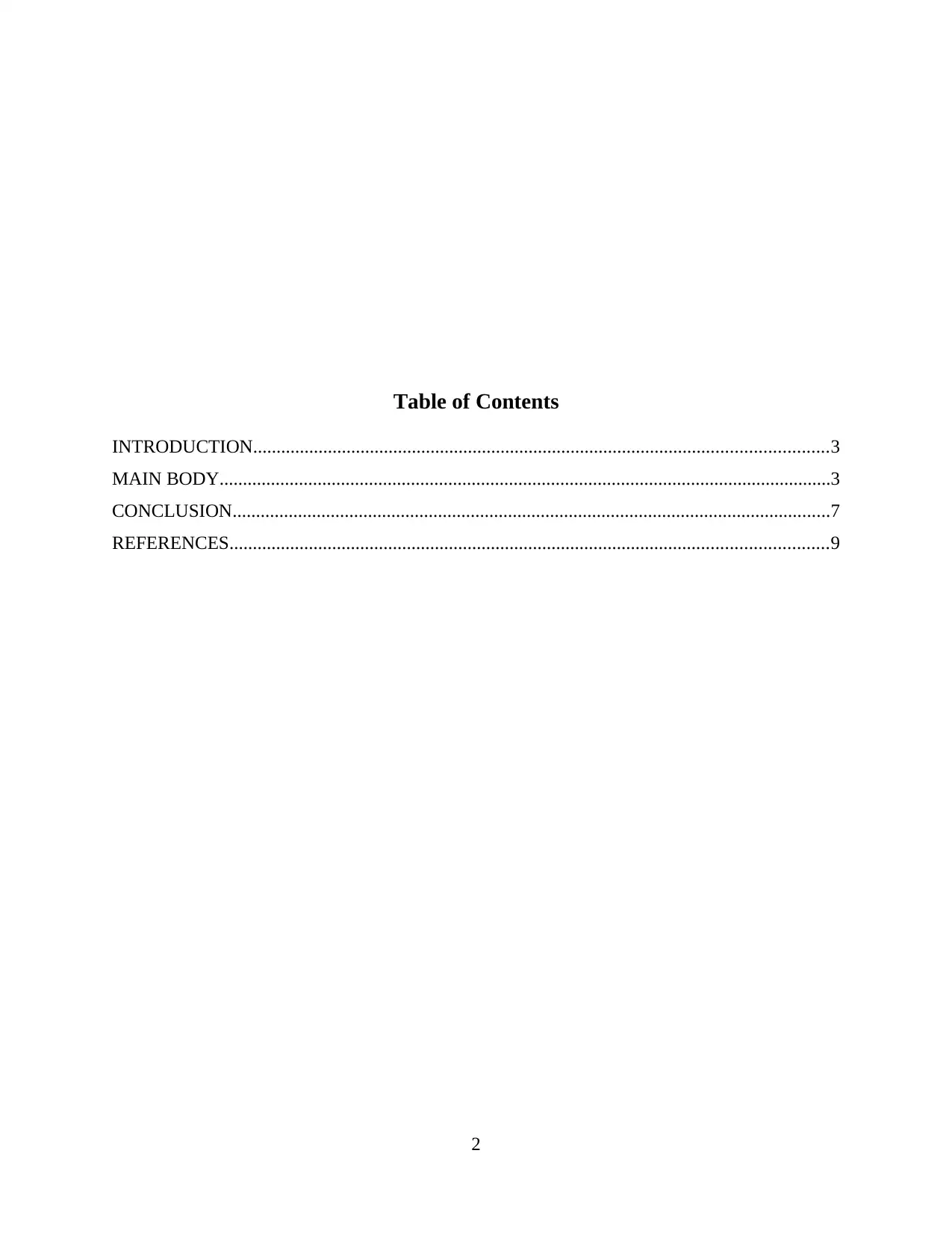
Table of Contents
INTRODUCTION...........................................................................................................................3
MAIN BODY...................................................................................................................................3
CONCLUSION................................................................................................................................7
REFERENCES................................................................................................................................9
2
INTRODUCTION...........................................................................................................................3
MAIN BODY...................................................................................................................................3
CONCLUSION................................................................................................................................7
REFERENCES................................................................................................................................9
2
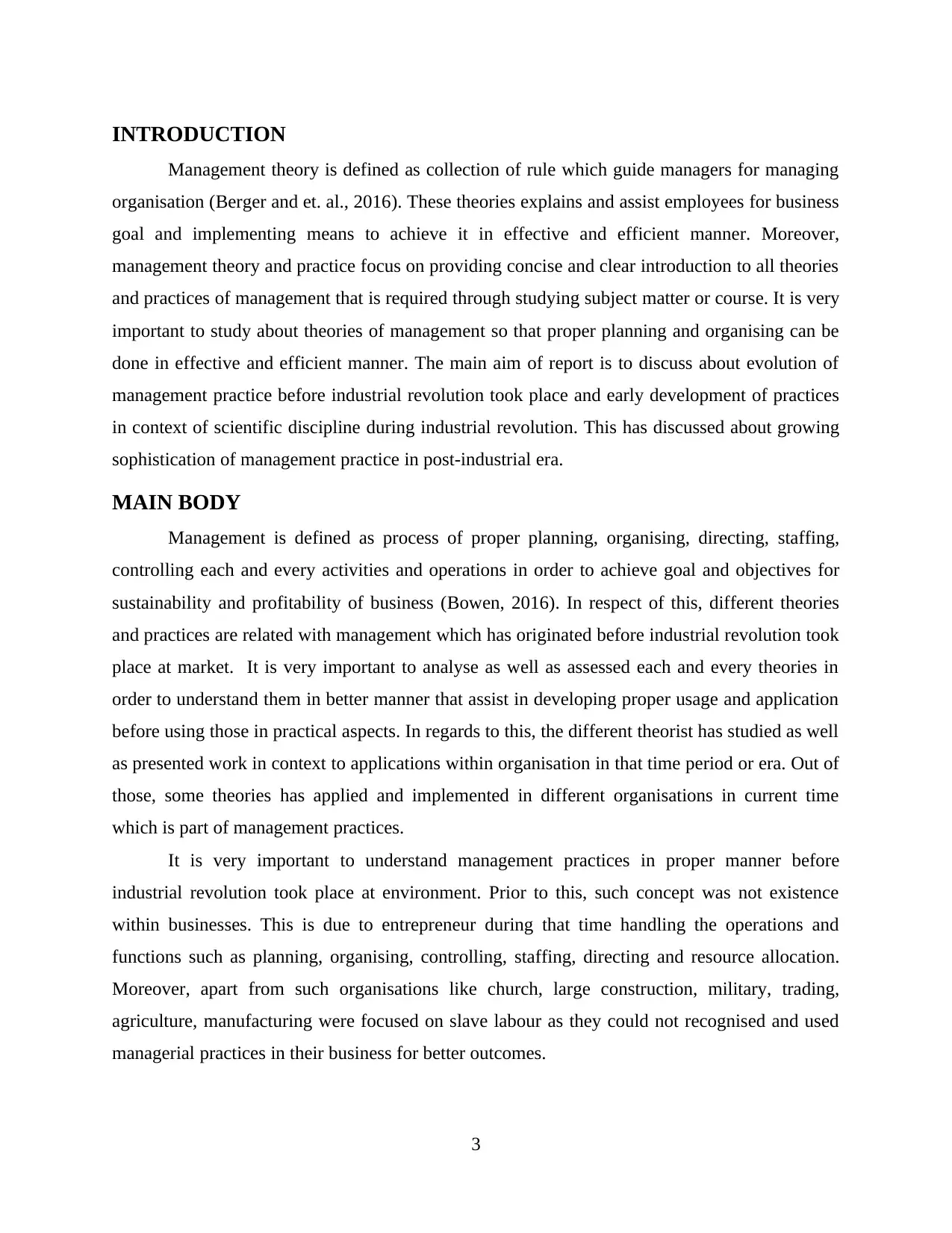
INTRODUCTION
Management theory is defined as collection of rule which guide managers for managing
organisation (Berger and et. al., 2016). These theories explains and assist employees for business
goal and implementing means to achieve it in effective and efficient manner. Moreover,
management theory and practice focus on providing concise and clear introduction to all theories
and practices of management that is required through studying subject matter or course. It is very
important to study about theories of management so that proper planning and organising can be
done in effective and efficient manner. The main aim of report is to discuss about evolution of
management practice before industrial revolution took place and early development of practices
in context of scientific discipline during industrial revolution. This has discussed about growing
sophistication of management practice in post-industrial era.
MAIN BODY
Management is defined as process of proper planning, organising, directing, staffing,
controlling each and every activities and operations in order to achieve goal and objectives for
sustainability and profitability of business (Bowen, 2016). In respect of this, different theories
and practices are related with management which has originated before industrial revolution took
place at market. It is very important to analyse as well as assessed each and every theories in
order to understand them in better manner that assist in developing proper usage and application
before using those in practical aspects. In regards to this, the different theorist has studied as well
as presented work in context to applications within organisation in that time period or era. Out of
those, some theories has applied and implemented in different organisations in current time
which is part of management practices.
It is very important to understand management practices in proper manner before
industrial revolution took place at environment. Prior to this, such concept was not existence
within businesses. This is due to entrepreneur during that time handling the operations and
functions such as planning, organising, controlling, staffing, directing and resource allocation.
Moreover, apart from such organisations like church, large construction, military, trading,
agriculture, manufacturing were focused on slave labour as they could not recognised and used
managerial practices in their business for better outcomes.
3
Management theory is defined as collection of rule which guide managers for managing
organisation (Berger and et. al., 2016). These theories explains and assist employees for business
goal and implementing means to achieve it in effective and efficient manner. Moreover,
management theory and practice focus on providing concise and clear introduction to all theories
and practices of management that is required through studying subject matter or course. It is very
important to study about theories of management so that proper planning and organising can be
done in effective and efficient manner. The main aim of report is to discuss about evolution of
management practice before industrial revolution took place and early development of practices
in context of scientific discipline during industrial revolution. This has discussed about growing
sophistication of management practice in post-industrial era.
MAIN BODY
Management is defined as process of proper planning, organising, directing, staffing,
controlling each and every activities and operations in order to achieve goal and objectives for
sustainability and profitability of business (Bowen, 2016). In respect of this, different theories
and practices are related with management which has originated before industrial revolution took
place at market. It is very important to analyse as well as assessed each and every theories in
order to understand them in better manner that assist in developing proper usage and application
before using those in practical aspects. In regards to this, the different theorist has studied as well
as presented work in context to applications within organisation in that time period or era. Out of
those, some theories has applied and implemented in different organisations in current time
which is part of management practices.
It is very important to understand management practices in proper manner before
industrial revolution took place at environment. Prior to this, such concept was not existence
within businesses. This is due to entrepreneur during that time handling the operations and
functions such as planning, organising, controlling, staffing, directing and resource allocation.
Moreover, apart from such organisations like church, large construction, military, trading,
agriculture, manufacturing were focused on slave labour as they could not recognised and used
managerial practices in their business for better outcomes.
3
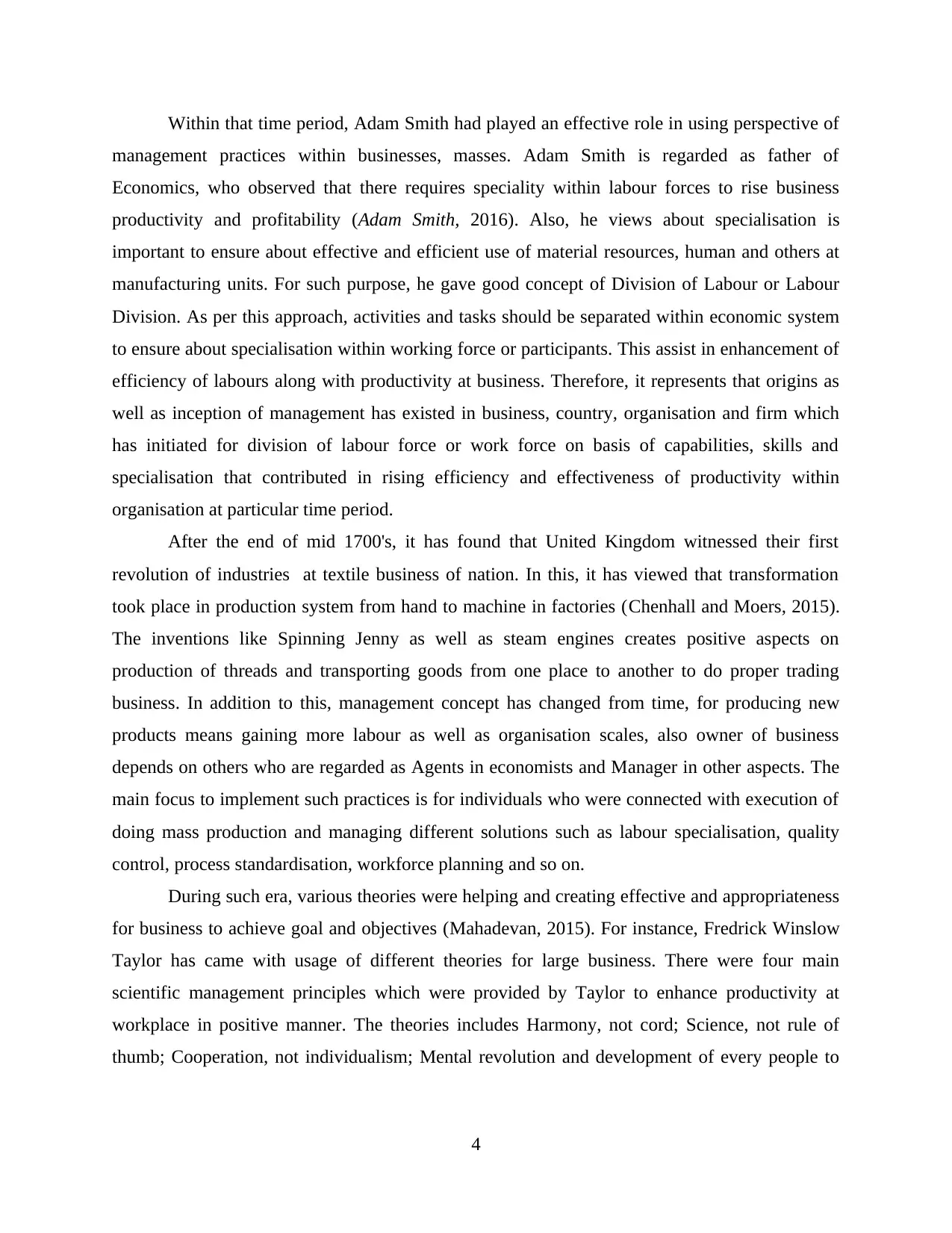
Within that time period, Adam Smith had played an effective role in using perspective of
management practices within businesses, masses. Adam Smith is regarded as father of
Economics, who observed that there requires speciality within labour forces to rise business
productivity and profitability (Adam Smith, 2016). Also, he views about specialisation is
important to ensure about effective and efficient use of material resources, human and others at
manufacturing units. For such purpose, he gave good concept of Division of Labour or Labour
Division. As per this approach, activities and tasks should be separated within economic system
to ensure about specialisation within working force or participants. This assist in enhancement of
efficiency of labours along with productivity at business. Therefore, it represents that origins as
well as inception of management has existed in business, country, organisation and firm which
has initiated for division of labour force or work force on basis of capabilities, skills and
specialisation that contributed in rising efficiency and effectiveness of productivity within
organisation at particular time period.
After the end of mid 1700's, it has found that United Kingdom witnessed their first
revolution of industries at textile business of nation. In this, it has viewed that transformation
took place in production system from hand to machine in factories (Chenhall and Moers, 2015).
The inventions like Spinning Jenny as well as steam engines creates positive aspects on
production of threads and transporting goods from one place to another to do proper trading
business. In addition to this, management concept has changed from time, for producing new
products means gaining more labour as well as organisation scales, also owner of business
depends on others who are regarded as Agents in economists and Manager in other aspects. The
main focus to implement such practices is for individuals who were connected with execution of
doing mass production and managing different solutions such as labour specialisation, quality
control, process standardisation, workforce planning and so on.
During such era, various theories were helping and creating effective and appropriateness
for business to achieve goal and objectives (Mahadevan, 2015). For instance, Fredrick Winslow
Taylor has came with usage of different theories for large business. There were four main
scientific management principles which were provided by Taylor to enhance productivity at
workplace in positive manner. The theories includes Harmony, not cord; Science, not rule of
thumb; Cooperation, not individualism; Mental revolution and development of every people to
4
management practices within businesses, masses. Adam Smith is regarded as father of
Economics, who observed that there requires speciality within labour forces to rise business
productivity and profitability (Adam Smith, 2016). Also, he views about specialisation is
important to ensure about effective and efficient use of material resources, human and others at
manufacturing units. For such purpose, he gave good concept of Division of Labour or Labour
Division. As per this approach, activities and tasks should be separated within economic system
to ensure about specialisation within working force or participants. This assist in enhancement of
efficiency of labours along with productivity at business. Therefore, it represents that origins as
well as inception of management has existed in business, country, organisation and firm which
has initiated for division of labour force or work force on basis of capabilities, skills and
specialisation that contributed in rising efficiency and effectiveness of productivity within
organisation at particular time period.
After the end of mid 1700's, it has found that United Kingdom witnessed their first
revolution of industries at textile business of nation. In this, it has viewed that transformation
took place in production system from hand to machine in factories (Chenhall and Moers, 2015).
The inventions like Spinning Jenny as well as steam engines creates positive aspects on
production of threads and transporting goods from one place to another to do proper trading
business. In addition to this, management concept has changed from time, for producing new
products means gaining more labour as well as organisation scales, also owner of business
depends on others who are regarded as Agents in economists and Manager in other aspects. The
main focus to implement such practices is for individuals who were connected with execution of
doing mass production and managing different solutions such as labour specialisation, quality
control, process standardisation, workforce planning and so on.
During such era, various theories were helping and creating effective and appropriateness
for business to achieve goal and objectives (Mahadevan, 2015). For instance, Fredrick Winslow
Taylor has came with usage of different theories for large business. There were four main
scientific management principles which were provided by Taylor to enhance productivity at
workplace in positive manner. The theories includes Harmony, not cord; Science, not rule of
thumb; Cooperation, not individualism; Mental revolution and development of every people to
4
Secure Best Marks with AI Grader
Need help grading? Try our AI Grader for instant feedback on your assignments.
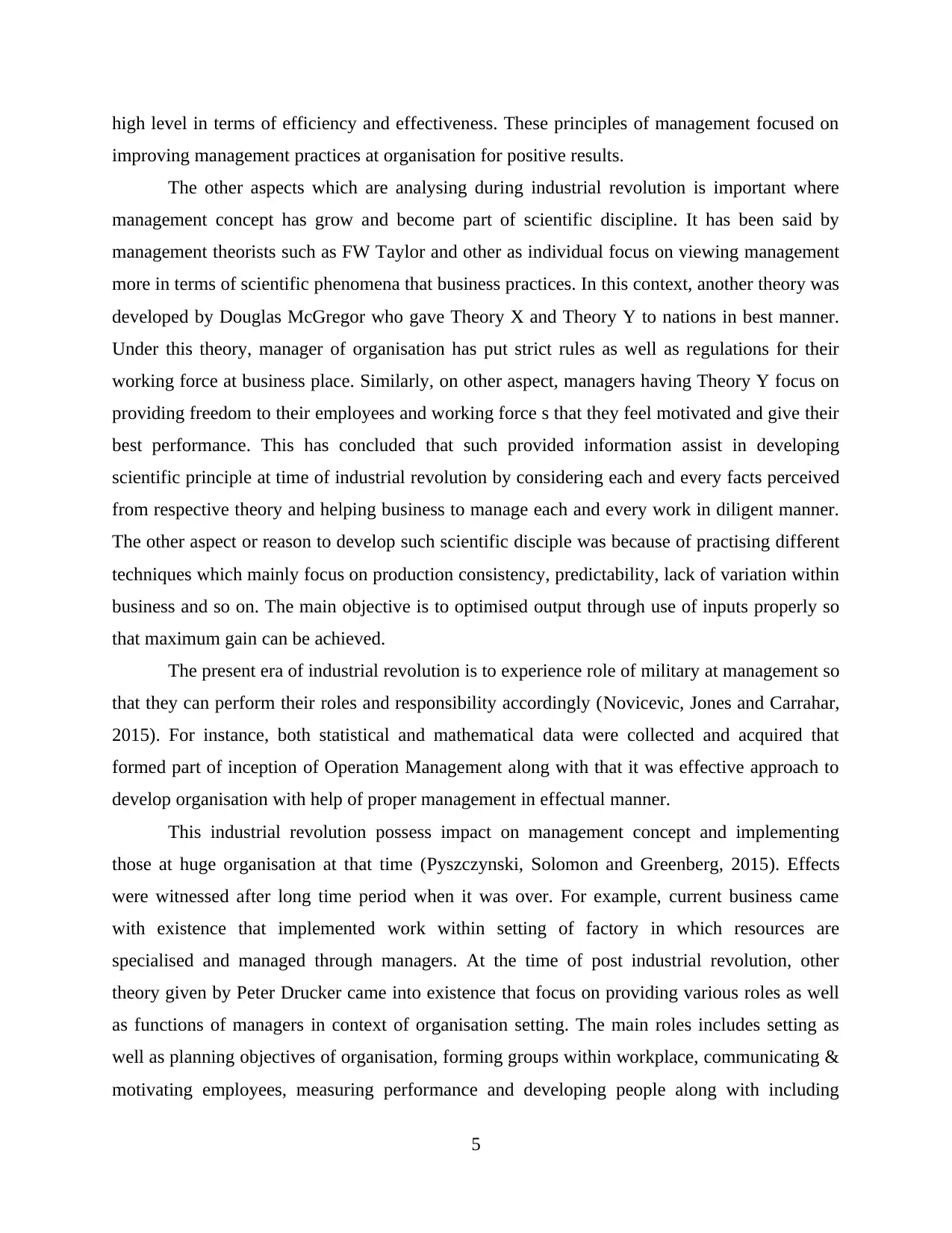
high level in terms of efficiency and effectiveness. These principles of management focused on
improving management practices at organisation for positive results.
The other aspects which are analysing during industrial revolution is important where
management concept has grow and become part of scientific discipline. It has been said by
management theorists such as FW Taylor and other as individual focus on viewing management
more in terms of scientific phenomena that business practices. In this context, another theory was
developed by Douglas McGregor who gave Theory X and Theory Y to nations in best manner.
Under this theory, manager of organisation has put strict rules as well as regulations for their
working force at business place. Similarly, on other aspect, managers having Theory Y focus on
providing freedom to their employees and working force s that they feel motivated and give their
best performance. This has concluded that such provided information assist in developing
scientific principle at time of industrial revolution by considering each and every facts perceived
from respective theory and helping business to manage each and every work in diligent manner.
The other aspect or reason to develop such scientific disciple was because of practising different
techniques which mainly focus on production consistency, predictability, lack of variation within
business and so on. The main objective is to optimised output through use of inputs properly so
that maximum gain can be achieved.
The present era of industrial revolution is to experience role of military at management so
that they can perform their roles and responsibility accordingly (Novicevic, Jones and Carrahar,
2015). For instance, both statistical and mathematical data were collected and acquired that
formed part of inception of Operation Management along with that it was effective approach to
develop organisation with help of proper management in effectual manner.
This industrial revolution possess impact on management concept and implementing
those at huge organisation at that time (Pyszczynski, Solomon and Greenberg, 2015). Effects
were witnessed after long time period when it was over. For example, current business came
with existence that implemented work within setting of factory in which resources are
specialised and managed through managers. At the time of post industrial revolution, other
theory given by Peter Drucker came into existence that focus on providing various roles as well
as functions of managers in context of organisation setting. The main roles includes setting as
well as planning objectives of organisation, forming groups within workplace, communicating &
motivating employees, measuring performance and developing people along with including
5
improving management practices at organisation for positive results.
The other aspects which are analysing during industrial revolution is important where
management concept has grow and become part of scientific discipline. It has been said by
management theorists such as FW Taylor and other as individual focus on viewing management
more in terms of scientific phenomena that business practices. In this context, another theory was
developed by Douglas McGregor who gave Theory X and Theory Y to nations in best manner.
Under this theory, manager of organisation has put strict rules as well as regulations for their
working force at business place. Similarly, on other aspect, managers having Theory Y focus on
providing freedom to their employees and working force s that they feel motivated and give their
best performance. This has concluded that such provided information assist in developing
scientific principle at time of industrial revolution by considering each and every facts perceived
from respective theory and helping business to manage each and every work in diligent manner.
The other aspect or reason to develop such scientific disciple was because of practising different
techniques which mainly focus on production consistency, predictability, lack of variation within
business and so on. The main objective is to optimised output through use of inputs properly so
that maximum gain can be achieved.
The present era of industrial revolution is to experience role of military at management so
that they can perform their roles and responsibility accordingly (Novicevic, Jones and Carrahar,
2015). For instance, both statistical and mathematical data were collected and acquired that
formed part of inception of Operation Management along with that it was effective approach to
develop organisation with help of proper management in effectual manner.
This industrial revolution possess impact on management concept and implementing
those at huge organisation at that time (Pyszczynski, Solomon and Greenberg, 2015). Effects
were witnessed after long time period when it was over. For example, current business came
with existence that implemented work within setting of factory in which resources are
specialised and managed through managers. At the time of post industrial revolution, other
theory given by Peter Drucker came into existence that focus on providing various roles as well
as functions of managers in context of organisation setting. The main roles includes setting as
well as planning objectives of organisation, forming groups within workplace, communicating &
motivating employees, measuring performance and developing people along with including
5
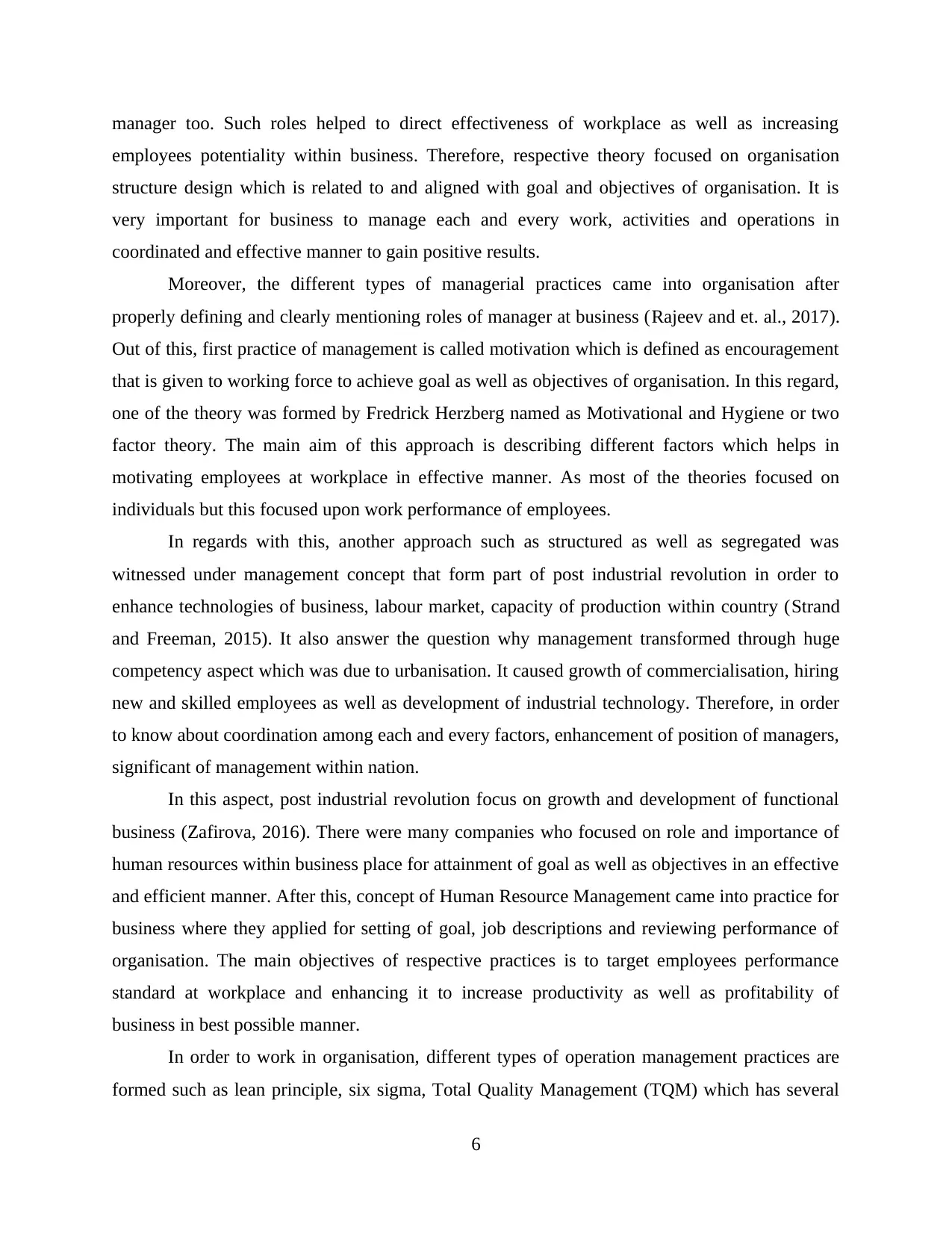
manager too. Such roles helped to direct effectiveness of workplace as well as increasing
employees potentiality within business. Therefore, respective theory focused on organisation
structure design which is related to and aligned with goal and objectives of organisation. It is
very important for business to manage each and every work, activities and operations in
coordinated and effective manner to gain positive results.
Moreover, the different types of managerial practices came into organisation after
properly defining and clearly mentioning roles of manager at business (Rajeev and et. al., 2017).
Out of this, first practice of management is called motivation which is defined as encouragement
that is given to working force to achieve goal as well as objectives of organisation. In this regard,
one of the theory was formed by Fredrick Herzberg named as Motivational and Hygiene or two
factor theory. The main aim of this approach is describing different factors which helps in
motivating employees at workplace in effective manner. As most of the theories focused on
individuals but this focused upon work performance of employees.
In regards with this, another approach such as structured as well as segregated was
witnessed under management concept that form part of post industrial revolution in order to
enhance technologies of business, labour market, capacity of production within country (Strand
and Freeman, 2015). It also answer the question why management transformed through huge
competency aspect which was due to urbanisation. It caused growth of commercialisation, hiring
new and skilled employees as well as development of industrial technology. Therefore, in order
to know about coordination among each and every factors, enhancement of position of managers,
significant of management within nation.
In this aspect, post industrial revolution focus on growth and development of functional
business (Zafirova, 2016). There were many companies who focused on role and importance of
human resources within business place for attainment of goal as well as objectives in an effective
and efficient manner. After this, concept of Human Resource Management came into practice for
business where they applied for setting of goal, job descriptions and reviewing performance of
organisation. The main objectives of respective practices is to target employees performance
standard at workplace and enhancing it to increase productivity as well as profitability of
business in best possible manner.
In order to work in organisation, different types of operation management practices are
formed such as lean principle, six sigma, Total Quality Management (TQM) which has several
6
employees potentiality within business. Therefore, respective theory focused on organisation
structure design which is related to and aligned with goal and objectives of organisation. It is
very important for business to manage each and every work, activities and operations in
coordinated and effective manner to gain positive results.
Moreover, the different types of managerial practices came into organisation after
properly defining and clearly mentioning roles of manager at business (Rajeev and et. al., 2017).
Out of this, first practice of management is called motivation which is defined as encouragement
that is given to working force to achieve goal as well as objectives of organisation. In this regard,
one of the theory was formed by Fredrick Herzberg named as Motivational and Hygiene or two
factor theory. The main aim of this approach is describing different factors which helps in
motivating employees at workplace in effective manner. As most of the theories focused on
individuals but this focused upon work performance of employees.
In regards with this, another approach such as structured as well as segregated was
witnessed under management concept that form part of post industrial revolution in order to
enhance technologies of business, labour market, capacity of production within country (Strand
and Freeman, 2015). It also answer the question why management transformed through huge
competency aspect which was due to urbanisation. It caused growth of commercialisation, hiring
new and skilled employees as well as development of industrial technology. Therefore, in order
to know about coordination among each and every factors, enhancement of position of managers,
significant of management within nation.
In this aspect, post industrial revolution focus on growth and development of functional
business (Zafirova, 2016). There were many companies who focused on role and importance of
human resources within business place for attainment of goal as well as objectives in an effective
and efficient manner. After this, concept of Human Resource Management came into practice for
business where they applied for setting of goal, job descriptions and reviewing performance of
organisation. The main objectives of respective practices is to target employees performance
standard at workplace and enhancing it to increase productivity as well as profitability of
business in best possible manner.
In order to work in organisation, different types of operation management practices are
formed such as lean principle, six sigma, Total Quality Management (TQM) which has several
6
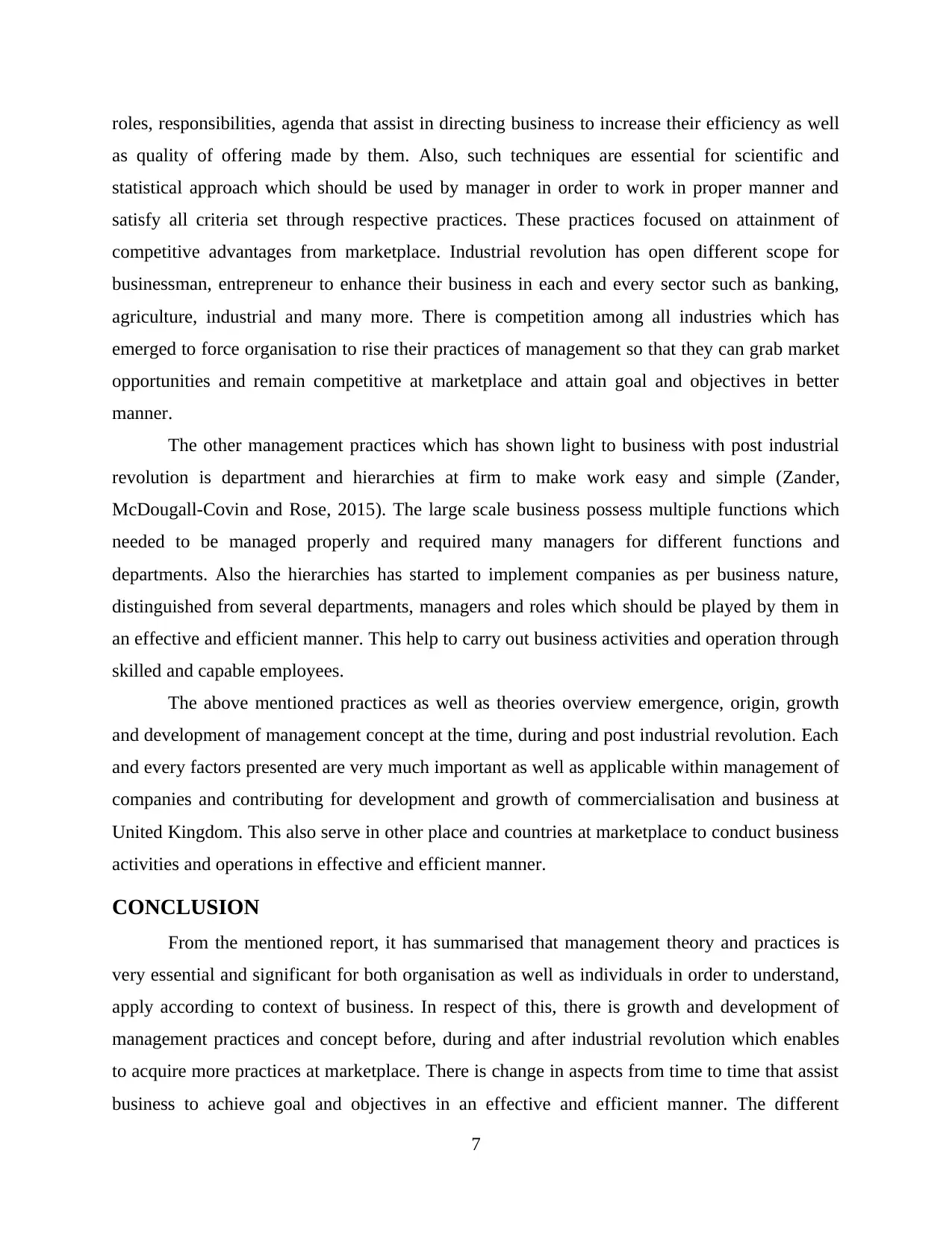
roles, responsibilities, agenda that assist in directing business to increase their efficiency as well
as quality of offering made by them. Also, such techniques are essential for scientific and
statistical approach which should be used by manager in order to work in proper manner and
satisfy all criteria set through respective practices. These practices focused on attainment of
competitive advantages from marketplace. Industrial revolution has open different scope for
businessman, entrepreneur to enhance their business in each and every sector such as banking,
agriculture, industrial and many more. There is competition among all industries which has
emerged to force organisation to rise their practices of management so that they can grab market
opportunities and remain competitive at marketplace and attain goal and objectives in better
manner.
The other management practices which has shown light to business with post industrial
revolution is department and hierarchies at firm to make work easy and simple (Zander,
McDougall-Covin and Rose, 2015). The large scale business possess multiple functions which
needed to be managed properly and required many managers for different functions and
departments. Also the hierarchies has started to implement companies as per business nature,
distinguished from several departments, managers and roles which should be played by them in
an effective and efficient manner. This help to carry out business activities and operation through
skilled and capable employees.
The above mentioned practices as well as theories overview emergence, origin, growth
and development of management concept at the time, during and post industrial revolution. Each
and every factors presented are very much important as well as applicable within management of
companies and contributing for development and growth of commercialisation and business at
United Kingdom. This also serve in other place and countries at marketplace to conduct business
activities and operations in effective and efficient manner.
CONCLUSION
From the mentioned report, it has summarised that management theory and practices is
very essential and significant for both organisation as well as individuals in order to understand,
apply according to context of business. In respect of this, there is growth and development of
management practices and concept before, during and after industrial revolution which enables
to acquire more practices at marketplace. There is change in aspects from time to time that assist
business to achieve goal and objectives in an effective and efficient manner. The different
7
as quality of offering made by them. Also, such techniques are essential for scientific and
statistical approach which should be used by manager in order to work in proper manner and
satisfy all criteria set through respective practices. These practices focused on attainment of
competitive advantages from marketplace. Industrial revolution has open different scope for
businessman, entrepreneur to enhance their business in each and every sector such as banking,
agriculture, industrial and many more. There is competition among all industries which has
emerged to force organisation to rise their practices of management so that they can grab market
opportunities and remain competitive at marketplace and attain goal and objectives in better
manner.
The other management practices which has shown light to business with post industrial
revolution is department and hierarchies at firm to make work easy and simple (Zander,
McDougall-Covin and Rose, 2015). The large scale business possess multiple functions which
needed to be managed properly and required many managers for different functions and
departments. Also the hierarchies has started to implement companies as per business nature,
distinguished from several departments, managers and roles which should be played by them in
an effective and efficient manner. This help to carry out business activities and operation through
skilled and capable employees.
The above mentioned practices as well as theories overview emergence, origin, growth
and development of management concept at the time, during and post industrial revolution. Each
and every factors presented are very much important as well as applicable within management of
companies and contributing for development and growth of commercialisation and business at
United Kingdom. This also serve in other place and countries at marketplace to conduct business
activities and operations in effective and efficient manner.
CONCLUSION
From the mentioned report, it has summarised that management theory and practices is
very essential and significant for both organisation as well as individuals in order to understand,
apply according to context of business. In respect of this, there is growth and development of
management practices and concept before, during and after industrial revolution which enables
to acquire more practices at marketplace. There is change in aspects from time to time that assist
business to achieve goal and objectives in an effective and efficient manner. The different
7
Paraphrase This Document
Need a fresh take? Get an instant paraphrase of this document with our AI Paraphraser
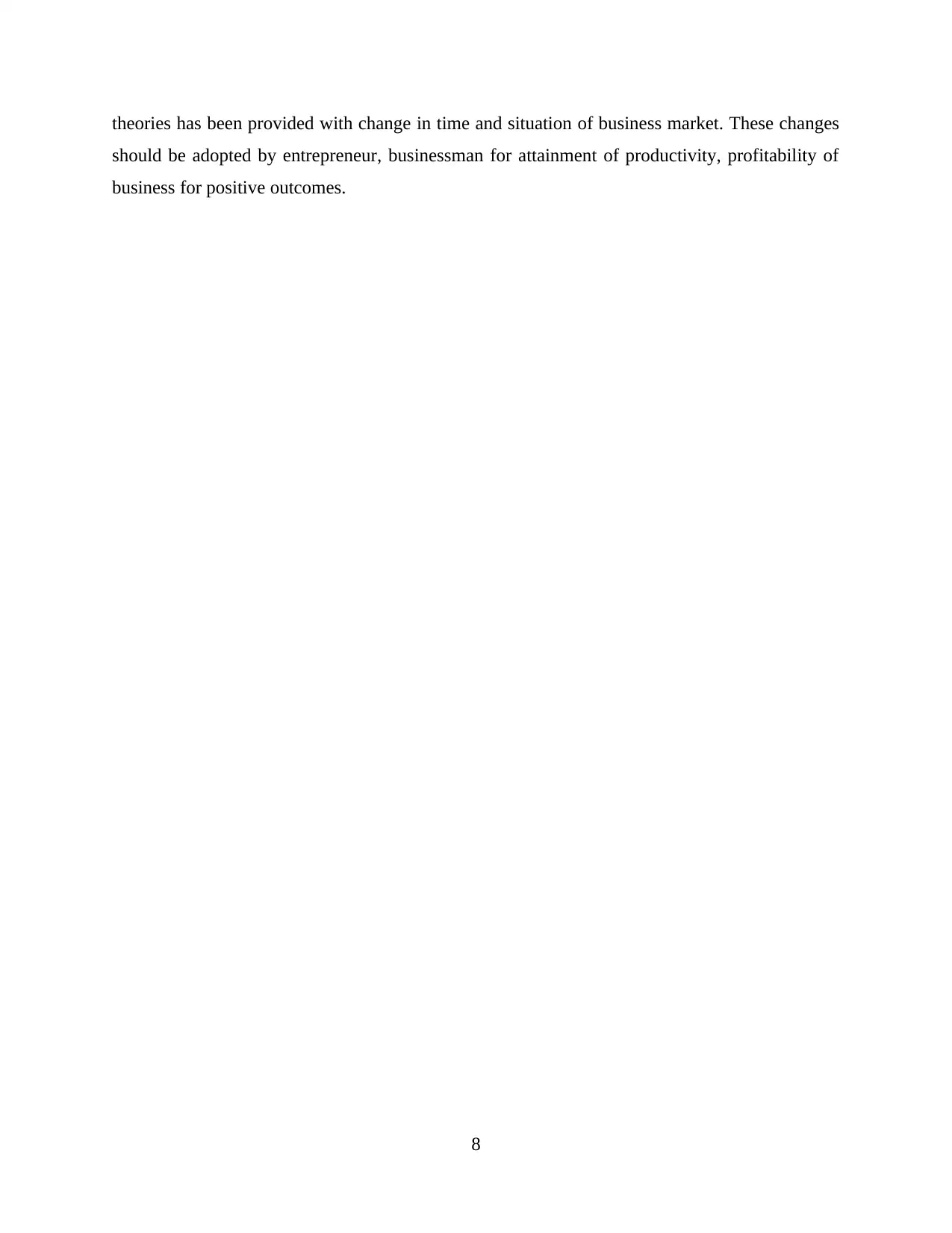
theories has been provided with change in time and situation of business market. These changes
should be adopted by entrepreneur, businessman for attainment of productivity, profitability of
business for positive outcomes.
8
should be adopted by entrepreneur, businessman for attainment of productivity, profitability of
business for positive outcomes.
8
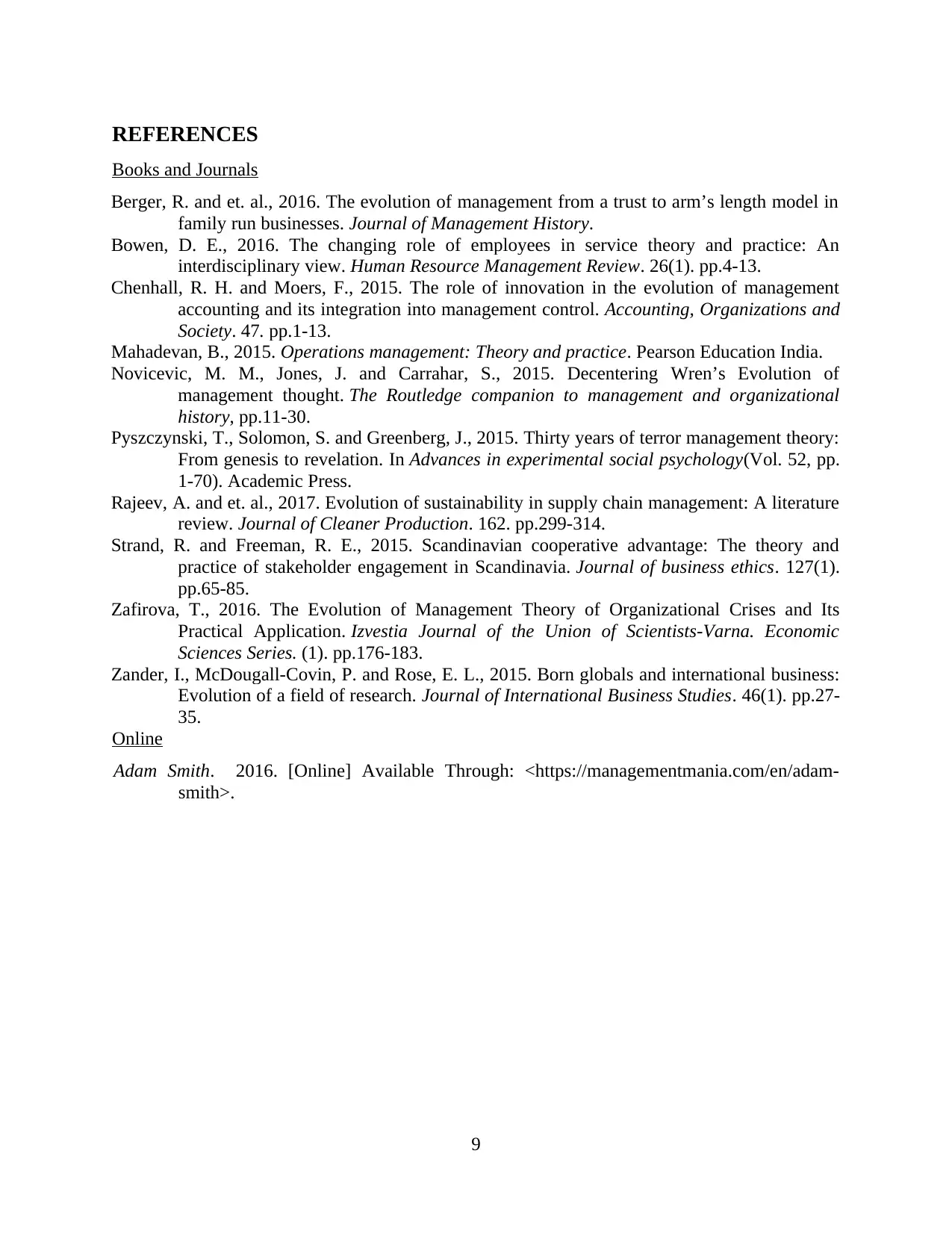
REFERENCES
Books and Journals
Berger, R. and et. al., 2016. The evolution of management from a trust to arm’s length model in
family run businesses. Journal of Management History.
Bowen, D. E., 2016. The changing role of employees in service theory and practice: An
interdisciplinary view. Human Resource Management Review. 26(1). pp.4-13.
Chenhall, R. H. and Moers, F., 2015. The role of innovation in the evolution of management
accounting and its integration into management control. Accounting, Organizations and
Society. 47. pp.1-13.
Mahadevan, B., 2015. Operations management: Theory and practice. Pearson Education India.
Novicevic, M. M., Jones, J. and Carrahar, S., 2015. Decentering Wren’s Evolution of
management thought. The Routledge companion to management and organizational
history, pp.11-30.
Pyszczynski, T., Solomon, S. and Greenberg, J., 2015. Thirty years of terror management theory:
From genesis to revelation. In Advances in experimental social psychology(Vol. 52, pp.
1-70). Academic Press.
Rajeev, A. and et. al., 2017. Evolution of sustainability in supply chain management: A literature
review. Journal of Cleaner Production. 162. pp.299-314.
Strand, R. and Freeman, R. E., 2015. Scandinavian cooperative advantage: The theory and
practice of stakeholder engagement in Scandinavia. Journal of business ethics. 127(1).
pp.65-85.
Zafirova, T., 2016. The Evolution of Management Theory of Organizational Crises and Its
Practical Application. Izvestia Journal of the Union of Scientists-Varna. Economic
Sciences Series. (1). pp.176-183.
Zander, I., McDougall-Covin, P. and Rose, E. L., 2015. Born globals and international business:
Evolution of a field of research. Journal of International Business Studies. 46(1). pp.27-
35.
Online
Adam Smith. 2016. [Online] Available Through: <https://managementmania.com/en/adam-
smith>.
9
Books and Journals
Berger, R. and et. al., 2016. The evolution of management from a trust to arm’s length model in
family run businesses. Journal of Management History.
Bowen, D. E., 2016. The changing role of employees in service theory and practice: An
interdisciplinary view. Human Resource Management Review. 26(1). pp.4-13.
Chenhall, R. H. and Moers, F., 2015. The role of innovation in the evolution of management
accounting and its integration into management control. Accounting, Organizations and
Society. 47. pp.1-13.
Mahadevan, B., 2015. Operations management: Theory and practice. Pearson Education India.
Novicevic, M. M., Jones, J. and Carrahar, S., 2015. Decentering Wren’s Evolution of
management thought. The Routledge companion to management and organizational
history, pp.11-30.
Pyszczynski, T., Solomon, S. and Greenberg, J., 2015. Thirty years of terror management theory:
From genesis to revelation. In Advances in experimental social psychology(Vol. 52, pp.
1-70). Academic Press.
Rajeev, A. and et. al., 2017. Evolution of sustainability in supply chain management: A literature
review. Journal of Cleaner Production. 162. pp.299-314.
Strand, R. and Freeman, R. E., 2015. Scandinavian cooperative advantage: The theory and
practice of stakeholder engagement in Scandinavia. Journal of business ethics. 127(1).
pp.65-85.
Zafirova, T., 2016. The Evolution of Management Theory of Organizational Crises and Its
Practical Application. Izvestia Journal of the Union of Scientists-Varna. Economic
Sciences Series. (1). pp.176-183.
Zander, I., McDougall-Covin, P. and Rose, E. L., 2015. Born globals and international business:
Evolution of a field of research. Journal of International Business Studies. 46(1). pp.27-
35.
Online
Adam Smith. 2016. [Online] Available Through: <https://managementmania.com/en/adam-
smith>.
9

10
1 out of 10
Related Documents
Your All-in-One AI-Powered Toolkit for Academic Success.
+13062052269
info@desklib.com
Available 24*7 on WhatsApp / Email
![[object Object]](/_next/static/media/star-bottom.7253800d.svg)
Unlock your academic potential
© 2024 | Zucol Services PVT LTD | All rights reserved.





